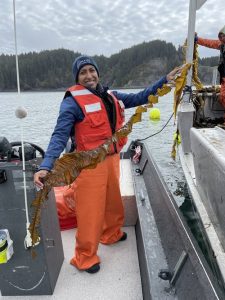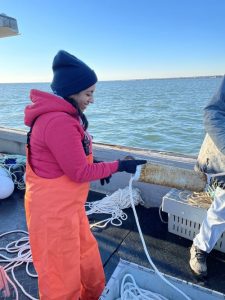Anoushka Concepcion was interviewed by Chaya Gaberria on April 26, 2023. Interview edited by Carla Schubiger.
“I would encourage everyone, specifically women and POC, to establish support systems early in their careers.” – Anoushka
 Please introduce yourself (briefly; name, position, what are you working on)?
Please introduce yourself (briefly; name, position, what are you working on)?
My name is Anoushka Concepcion, and I am an Associate Extension Educator in Marine Aquaculture with Connecticut Sea Grant and UConn’s Cooperative Extension. I am working with various aquaculture industry sectors to address barriers preventing the expansion of the domestic seaweed aquaculture industry in Connecticut and beyond.
1. How did you get your first job in the field of aquaculture? And what was the position?
My first job in aquaculture was working for Shrimp Improvement Systems in the Florida Keys. I met a recruiter at one of the Aquaculture America meetings as an undergraduate. My main job was cultivating microalgae (diatoms) for the larval shrimp. During the off-season, I worked in the other departments, including maturation, larval culture, and brood stock husbandry. It was a great way to learn all the components of a nursery operation.
2. What advice would you give someone starting in the field of aquaculture (maybe a student)?
Learn as much as you can about the different types of aquaculture and jobs associated with supporting the industry, such as roles in regulatory, engineering, seafood supply, and markets. It is important to have a good understanding of what goes into making aquaculture commercially viable. Apply for various internships and attend conferences and other events. Most importantly, talk to different folks and those that support the industry. Ask them what their challenges are. You will learn a lot more about how the industry works.
3. What advice would you give your younger self?
Broaden the scope and types of folks you work with, don’t limit yourself to a specific discipline or industry, and apply all the knowledge you have learned throughout college. For example, I couldn’t find a job in aquaculture after graduate school, however, I utilized my knowledge in biology and chemistry to find a job in the pharmaceutical industry. As a result, I was able to pay my bills and save money, while I looked for a job in aquaculture.
4. What is something that most people don’t know about the aquaculture industry or your role in the industry?
What most people don’t know is how regulated the aquaculture industry is. From permitting to food safety, there are a lot of moving parts (and people) to get the product from the farm to the plate. I have a better understanding of how important regulatory roles are in making the industry economically viable. From mitigating negative environmental impacts to ensuring seafood is produced safely, regulators have a big role in sustaining the success of the industry. It’s not always perfect, which is where someone like me can help to find ways for all the sectors to work together. In addition to doing applied research, I facilitate conversations between industry and regulators to find common goals and then work with them to implement plans to reach those goals.
5. If you could be any aqua species, what would you be and why?
I would be a black sea bass. They are very interactive, almost like puppies! For my Masters’ thesis, I evaluated varying levels of protein in feed on the growth of black sea bass juveniles. The fish would follow me around the tank, spitting water in my face, asking to be fed. They were very entertaining to work with.
6. In your opinion, what is the most fascinating part of the aquaculture industry? Why?
I am always fascinated by the many types of organisms we grow. Our industry is very diverse and creates a space for many kinds of producers. We also value responsible production, which is so important when discussing aquaculture with general audiences.
7. What is a trend that you have seen come and go? Or where do you envision the aquaculture industry in 10 years?
Aquaponics has been of great interest for many years; however, in CT we have seen many aquaponics efforts come and go due to the lack of funding to maintain the operations. Unfortunately, many of these operations were not independently viable and relied on subsidies, which was not sustainable.
8. Favorite seafood dish? Would you like to share your favorite recipe?
I love eating raw oysters on the half-shell. Nothing fancy, just fresh out of the water.
9. What is your favorite aqua and/or non-aqua past-time?
I enjoy exploring the outdoors with my children.
10. If applicable: Being a female/entrepreneur/POC in aquaculture what are the challenges/successes you like to share?
As an immigrant woman of color in the United States and aquaculture, I’ve had to navigate between cultural expectations and finding my own path. When I got started in aquaculture, no one looked like me, and I had a difficult time “fitting in”. Unlike my colleagues, I grew up in NYC and not in a coastal community, so I didn’t have the same experiences as they did. As a result, it was difficult relating to them. The academic field is very competitive, and as a result I have not been taken seriously. Others have tried to intimidate me. Despite these experiences, I am fortunate to have great personal and professional support systems, with mentors who consistently encourage, yet challenge me, to always perform to the best of my abilities. I would encourage everyone, specifically women and POC, to establish support systems early in their careers.
11. Anything people would be surprised to know about you?
I am obsessed with Star Trek and am currently geeking out to this season of Picard. I also love a great Drag Show – the talent is awe-inspiring, and the costumes and music are so joyful.
